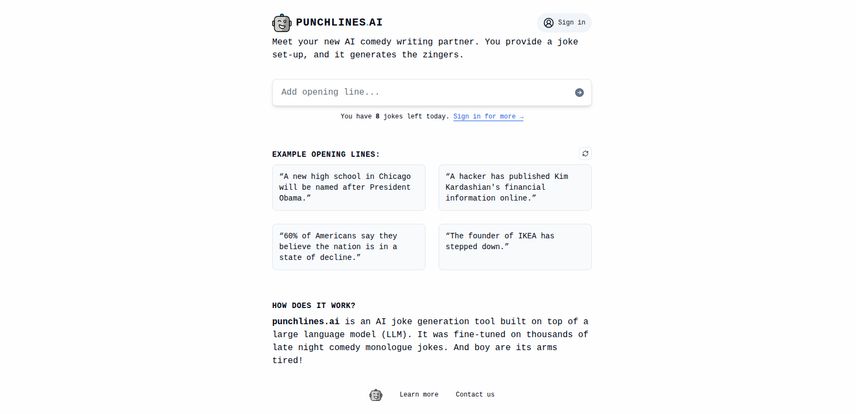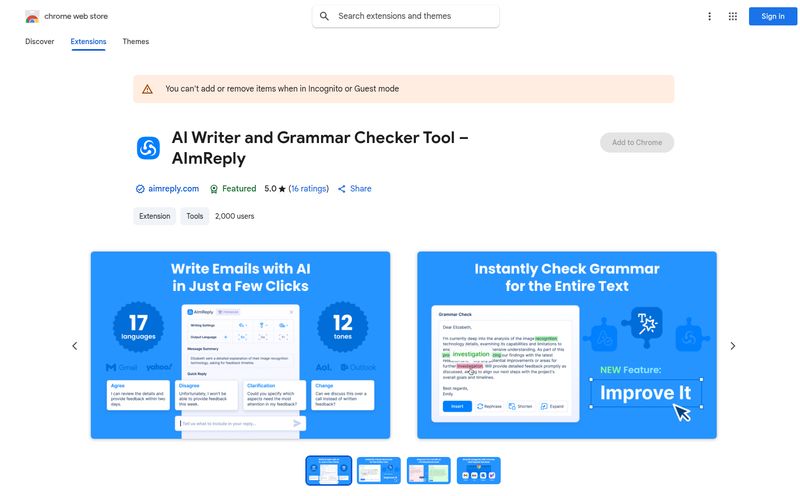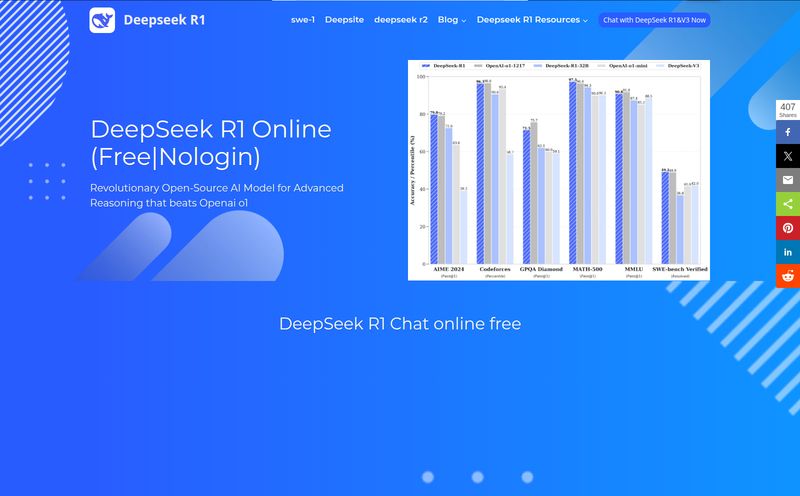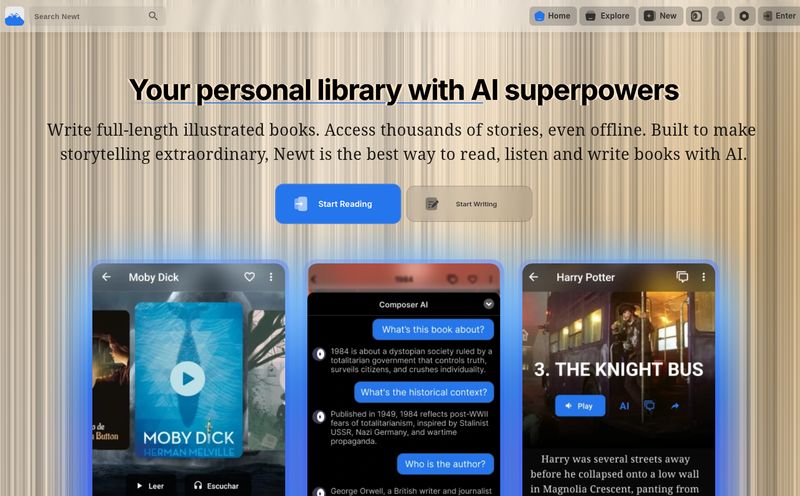Staring at a blank page is a special kind of terror. As a blogger and content creator, I know it well. It's the digital equivalent of stage fright. You’ve got the topic, you’ve got the coffee, but the words just… won’t. Now, imagine your job is to be funny on top of that. Every. Single. Day. The pressure is immense.
This brings me to a question that's been rattling around the marketing and creative worlds for a while now: Can AI actually be creative? Can a machine, a series of algorithms, truly understand humor? We've seen AI write blog posts, generate images, and even code websites. But comedy? That feels different. It's about timing, nuance, shared experience. It's human.
Or is it? I recently stumbled across a tool called Punchlines.ai, which bills itself as a "new AI comedy writing partner." My curiosity, as you can imagine, was piqued. An AI sidekick for zingers? I had to see this for myself.
What Exactly Is Punchlines.ai?
At its core, Punchlines.ai is beautifully simple. You give it a setup line—a news headline, a random observation—and it spits back a handful of potential punchlines. Think of it as a joke-generating machine gun. You fire a premise, and it sprays out a volley of zingers.
But here’s the bit that caught my SEO-nerd brain. It’s not just a generic language model like the standard ChatGPT. According to their site, it’s built on OpenAI's GPT models but has been specifically fine-tuned on over 10,000 late-night comedy monologue jokes. That’s a crucial detail. Fine-tuning an AI is like sending it to a specialist school. Instead of knowing a little about everything, it becomes an expert in one specific thing—in this case, the rat-a-tat, topical style of hosts like Seth Meyers or Stephen Colbert. It’s been trained to think like a monologue writer. They even have a little dad joke on their own site about it: "And boy are its arms tired!" Gotta appreciate a platform that doesn't take itself too seriously.

Visit punchlines.ai
My First Impressions and Getting Started
Landing on the Punchlines.ai website is a breath of fresh air. There are no pop-ups, no confusing menus. Just a clean, white screen with a single text box that says, "Add opening line…" It’s so minimalist, it's almost calming. You can't get it wrong.
They provide a few examples to get you started, like “A new high school in Chicago will be named after President Obama,” or “The founder of IKEA has stepped down.” This immediately sets the tone. This tool is designed for that specific, headline-driven humor. It’s not trying to write a long, narrative story-joke. It’s here for the quick hits.
Putting It to the Test: Let's Write Some Jokes
Alright, theory is great, but the proof is in the punchline. I decided to feed it a few setups, ranging from my own professional world to the completely absurd.
My first setup was topical and a bit niche:
Google announced another algorithm update, and SEOs are panicking.
Here’s a taste of what it spat back (I'm paraphrasing the better ones):
- "Yeah, SEOs haven't been this scared since someone explained what 'sunlight' is."
- "The update is called the 'Caffeine' update, because you'll be up all night fixing your website." (A nice callback for us old-school SEOs!)
- "It's the only time you'll see a grown man cry over the word 'penguin'."
Okay, not bad! The first one is a decent stereotype joke, the second is a solid pun with a nice industry nod, and the third is genuinely clever if you know about Google's Penguin update. Are they groundbreaking? No. But are they a fantastic starting point? Absolutely.
Next, I went for something more absurd:
My Roomba vacuum cleaner has started demanding a salary.
The results were… more varied. Some were just weird, but a couple landed:
- "It's demanding to be paid in crumbs and dog hair."
- "I told it to unionize with the toaster, but they have creative differences."
This is where you see the AI's gears turning. It’s making logical connections—vacuums and crumbs, appliances and unions—but it lacks that spark of genuine, lived-in absurdity. Still, "creative differences" with a toaster? I chuckled.
The Good, The Bad, and The... AI-Weird
After playing around with it for a while, a clear picture emerged. This tool has some real strengths, but it also has the predictable quirks of any AI trying to be creative.
The Upside: A Cure for the Blank Page
The biggest advantage of Punchlines.ai is its speed. It’s an incredible brainstorming partner. It's less like a seasoned comedian and more like a hyperactive intern who just chugged three Red Bulls and read a book of puns. It throws so much at the wall that something is bound to stick. For anyone experiencing writer's block, this is a godsend. It gets the ball rolling.
The fact that its trained on a specific comedic style is also a huge plus. It’s not just generating random sentences; it’s mimicking a proven formula. This focus makes its outputs far more consistent than if you were to just ask a general AI to "tell me a joke."
The Downsides and Quirks
Now, for the reality check. The quality is, lets say, inconsistent. For every clever zinger, there are three or four duds that are either nonsensical, grammatically bizarre, or just… flat. You have to be willing to sift for the gold, which is fine. It's a tool, not a magic wand.
There's also a limit on the number of free jokes you can generate per day. This is a classic freemium model. It gives you a taste, but if you want to make it a core part of your workflow, you'll likely have to sign in and potentially pay up. And honestly, that's fair.
The biggest downside, though, is inherent to all AI. It lacks genuine context and life experience. It can make a joke about IKEA because it's crunched data on IKEA. It can't tell a joke about the time it frustratingly tried to assemble an IKEA bookshelf itself. That's the human element, and it's not going anywhere. This tool can't replace a comedian, but it can sure as hell help one.
Who Is Punchlines.ai Really For?
I can see a few groups getting a ton of value out of this.
- Social Media Managers: Need a witty tweet or a funny Instagram caption, fast? This is your new best friend. It can help you pump out timely, relevant content that gets a chuckle.
- Comedy Writers & Comedians: This is the ultimate warm-up tool. Use it to practice joke structures, brainstorm tags for an existing bit, or just get your brain into a comedic headspace before a writing session.
- Content Creators & Bloggers: Just like me! Sometimes you need a funny sub-heading, a clever email subject line, or a way to make a dry topic more engaging. This is perfect for injecting a bit of levity.
Who isn't it for? Someone expecting a fully-formed, perfectly polished, five-minute stand-up routine. It's an assistant, not the main act.
What About the Cost of a Laugh?
This is the million-dollar question, isn't it? As of my review, there isn't a public pricing page. The model seems to be a free trial with a daily limit on generations. You're prompted to "Sign in for more," which strongly suggests a subscription or credit-based system for heavier users.
In my experience, tools like this often land in the $10-$20 per month range for unlimited or very high-volume use. Given its specific niche, I think that would be a fair price for someone who uses it professionally. For the casual user, the free daily jokes are probably more than enough to have some fun.
Frequently Asked Questions about Punchlines.ai
Is Punchlines.ai free to use?
Yes, it is free to use with a daily limit on the number of jokes you can generate. To get more, you need to sign up, which likely leads to a paid plan for unlimited access.
What kind of jokes does it write?
It specializes in short, topical, monologue-style punchlines, very similar to what you'd hear on a late-night talk show. It's best with news headlines or simple, factual setups.
Can I use the jokes it generates commercially?
This is a bit of a grey area with all AI content. While you can certainly use it for inspiration, I would recommend rewriting or adapting the jokes to make them your own before using them in a commercial project. Always check the platform's Terms of Service.
How is this different from just using ChatGPT?
The key difference is the fine-tuning. Punchlines.ai was trained specifically on a massive dataset of comedy jokes, giving it a more focused and consistent comedic voice for that particular style compared to a general-purpose AI.
Does Punchlines.ai understand complex humor or satire?
It's hit-or-miss. It's much better at direct puns, associations, and simple ironic twists than it is at deep, layered satire. It doesn't truly 'understand' so much as it predicts the next most likely word in a comedic pattern.
The Final Verdict: Should You Add This AI to Your Writer's Room?
So, back to the big question: can AI be funny? My verdict after using Punchlines.ai is a solid... kinda. It can be a funny assistant. It can be a great spark plug. It can't, however, replicate the soul, timing, and lived experience of a human comedian.
And you know what? That’s perfectly okay. I don't see Punchlines.ai as a threat to creativity; I see it as a genuinely useful tool that can augment it. It’s a sparring partner that never gets tired, a brainstorming session on-demand. For creatives, marketers, and anyone looking to inject a bit more humor into their writing, it's absolutely worth a shot.
It won't write your whole set for you, but it might just give you the one line you were missing. Go give it a try. The worst that can happen is you get a few free laughs.
Reference and Sources
- Punchlines.ai Official Website
- OpenAI's GPT-4 Information
- Vulture's Comedy Section for a look at the world of professional comedy writing.



